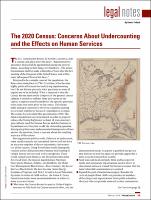Please use this identifier to cite or link to this item:
https://hdl.handle.net/20.500.12202/4652Full metadata record
| DC Field | Value | Language |
|---|---|---|
| dc.contributor.author | Pollack, Daniel | |
| dc.date.accessioned | 2019-09-10T20:58:51Z | |
| dc.date.available | 2019-09-10T20:58:51Z | |
| dc.date.issued | 2019-02 | |
| dc.identifier.citation | Pollack, Daniel. (February 2019). The 2020 Census: Concerns About Undercounting and the Effects on Human Services. Policy & Practice. 25, 28. | en_US |
| dc.identifier.issn | 1942-6828 | |
| dc.identifier.uri | https://hdl.handle.net/20.500.12202/4652 | |
| dc.description | "Legal Notes" | en_US |
| dc.description.abstract | The U.S. Constitution directs, by Article I, Section 2, that a Census take place every ten years: “Representatives and direct Taxes shall be apportioned among the several States...according to their respective Numbers....The actual Enumeration shall be made within three Years after the first meeting of the Congress of the United States, and within every subsequent Term of ten Years.” --- Designed to be a simple count of the population, the first census took place in 1790. Over time, it has become highly political because the underlying implementing laws1 do not dictate precisely what questions or areas of inquiry are to be included. What is required is that the Census Bureau must notify Congress of the general census subjects it intends to address three years prior to the census. Congress must be notified of the specific questions to be asked two years prior to the census. This decennial’s principal controversy involves a question seeking to ascertain whether or not each respondent is a citizen. The census has not asked this question since 1950. The Justice Department says it is needed in order to properly enforce the Voting Rights Act. At least 18 state attorneys general have sued the Census Bureau and the Commerce Department over the plan to add the citizenship question. Anticipating that some undocumented immigrants will not answer the question, there is concern about the resulting accuracy of the census. | en_US |
| dc.language.iso | en_US | en_US |
| dc.publisher | American Public Human Services Association | en_US |
| dc.relation.ispartofseries | Policy & Practice;77(1) | |
| dc.rights | Attribution-NonCommercial-NoDerivs 3.0 United States | * |
| dc.rights.uri | http://creativecommons.org/licenses/by-nc-nd/3.0/us/ | * |
| dc.subject | 2020 Census | en_US |
| dc.subject | human services | en_US |
| dc.subject | Census Bureau | en_US |
| dc.subject | funding | en_US |
| dc.subject | budget cuts | en_US |
| dc.title | The 2020 Census: Concerns About Undercounting and the Effects on Human Services. | en_US |
| dc.type | Article | en_US |
| dc.contributor.orcid | 0000-0001-7323-6928 | |
| local.yu.facultypage | https://www.yu.edu/faculty/pages/pollack-daniel | |
| Appears in Collections: | Wurzweiler School of Social Work: Faculty publications | |
Files in This Item:
| File | Description | Size | Format | |
|---|---|---|---|---|
| art APHSA 2020 Census Concerns About Undercounting PDF.pdf | 124.45 kB | Adobe PDF |  View/Open |
This item is licensed under a Creative Commons License

